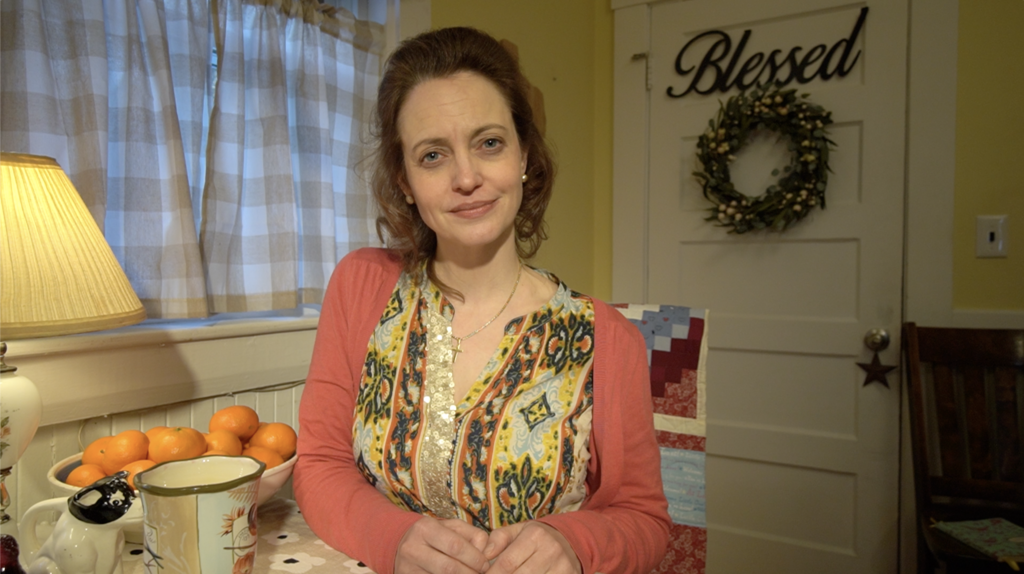
Stacy Fischer pretty in pink as Trisha Lee in “The Pink Unicorn.”
Presented by SpeakEasy Stage Company
Written by Elise Forier Edie
Directed by M. Bevin O’Gara
Featuring Stacy Fischer
Video production design by Ari Herzig
Music by John-Allison Weiss
Dialect coaching by D’Arcy Dersham
Post-show Panel: “Learning the Impact of Language”
Panelists: Taj M. Smith (he/him), Katie Omberg (she/they), Mx. Chris Paige (they/them), Leo Austin-Spooner (he/they)
March 5-18, 2021
The performance is available to stream
RUN TIME: 80 minutes, followed by a post-show panel discussion exploring the themes of the play
Boston, MA
SpeakEasy on Facebook
Critique by Kitty Drexel
SpeakEasy Stage’s Content Advisory: “The Pink Unicorn follows one mother’s journey to accept her genderqueer teenager. In telling this story, this play contains multiple instances of transphobia and misgendering as well as ableist and fatphobic language.”
VIMEO — If it takes a white person to reach a white person on issues of racial inequity (it does), then one could reason that it takes a cis-hetero person to reach a cis-hetero person on issues of gender diversity. I’m not saying that these issues are at all equal. Hardly. What I am saying is that the compassionate tactics of one righteous cause will work on another equally as valiant cause.
SpeakEasy presents The Pink Unicorn through March 18. It is about a mother, Trisha Lee (Stacy Fischer in an endearing performance), coming to terms with her teenager’s genderqueer identity. Trisha is sharing her story through the virtual family and faith summit series, Walking Together. She sits at her kitchen table, sips tea and tells the anecdotes that culminate in her acceptance of her beloved child, Jo.
SpeakEasy Stage Company has done an excellent job of supporting the LGBTQIA community while marketing The Pink Unicorn. The company, estimating that its audience would be unschooled in gender identity politics, went to great lengths to make The Pink Unicorn’s themes easy to understand. Critics were told which pronouns to use in our written responses and how to refer to the character Jo. Content warnings told us that Trisha would discuss her Christian beliefs within the context of Jo’s gender identity. These warnings also told us why others might be hurt by Trisha’s words.
Even with all of the work SpeakEasy put into supporting the LGBTQIA community, I was hesitant to watch The Pink Unicorn. (I am cis but my brilliant wife is non-binary. We’re both stalwart activists dedicated to social justice.) The Pink Unicorn is told from the perspective of Trish who is both cis and heterosexual.
Is it good practice in a binary-normative world to be wary; messages from cis people to the queer community have a long, storied history of causing harm. Representatives of the Christian faith are some of the worst offenders. Atrocious deeds have been committed against our community in a vengeful God’s name. The road to Hell is paved with good intentions.
I’ve read plays about gender identity that don’t work. These plays fail horribly because they make the parent character’s bigoted frustration the child character’s problem. Stories with the potential to be about parallel discoveries instead became stories about blame and finger-pointing. They’re mean-spirited and unkind. Maybe someone wants to see a play about familial estrangement but I don’t.
I was worried that The Pink Unicorn was another one of those hateful plays. To my readers existing on the gender spectrum’s sliding scale, it is not one of those plays.
Yes, SpeakEasy’s content warnings are legitimate. But I am happy to say, while the character of Trisha Lee does say some appallingly insensitive things, she’s doing it while learning to be a better person. Please offer pretend-human Trisha Lee the same patience that others granted you as you began your LGBTQIA metamorphosis.
We know that it takes years to deprogram ourselves of homophobia, racism, ableism, fatphobia, and other hateful institutions. All of that is hard work. Patience is necessary.
I ask for your compassion, not just because compassion is necessary to our cause of equity and diversity, but because Trisha Lee is the straightforward (pun intended) kind of person bigots can relate to. Trisha isn’t confusing; she’s approachable, a little boring. She’s relatable. She’s nice in the classical sense. Trisha is the cis-hetero ally who will convince other cis-heteros that there’s a seat in the pew for everyone. We need Trisha to convince the others like her that the work is worth it. We are worth the work it requires to get to know us.
I wish someone like Trisha had stood for me when I came out to my parents. Sometimes, even after a decade of trying to talk to your family about gender identity, anti-racism and ableism, parents can’t be persuaded to lead with love instead of old-fashioned Christian fear. The LGBTQIA community needs as many moms as it can get, warts and all.
After the performance, please continue watching the stream through the insightful panel discussion, “Learning the Impact of Language.” That SpeakEasy included this panel tells the LGBTQIA community that we were considered at every step of the production. One might not agree with everything the panelists say, but it is significant that SpeakEasy gave them a platform. Please watch so SpeakEasy will do it again.
SpeakEasy generously provides a page devoted to additional resources HERE.
Viewers requiring even more information can contact Alex Lonati, Community Programs and Events Manager: alexlonati@speakeasystage.com or at 617-482-3279.
Enjoyed The Pink Unicorn? Try SpeakEasy’s Play Discussion Club: Series 6. This session features three plays by transgender, nonbinary, and two-spirit playwrights.
Fun unicorn videos:
One for the adults:
One for the kids:
